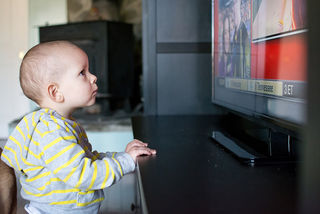Internet Addiction
TV: The Forgotten Culprit
New study ties early TV exposure to unhealthy adolescent habits.
Posted April 3, 2018

How many times have you heard the phrase, “Don’t use television as your babysitter”—but have been guilty of doing just that? With the advent of smartphones and tablets—the new babysitters—young children are getting more screen time than ever before.
In response to the proliferation of digital devices, most current research has focused on the impact of inundating young children with these newer electronic screens. I have also addressed the problems of too much screen time on iPads and cellphones among the young set as well for older children, highlighting studies that show devices can affect academics, behavior, teenager’s sleep and more.
In the midst of all the deep dives into the effects of digital devices on children over the past ten years, many experts and articles focus specifically on curbing time spent with smartphones and tablets. Yet, television—the once-reigning culprit—has been largely ignored. While researchers and psychologists have well-placed concerns over the newest technology, television has been sidelined until recently.
Researchers at the University of Montreal have brought TV watching back into focus. Their new study suggests why it’s a bad idea for parents to park toddlers in front of the television screen: Too much TV watching at age two is associated with poor habits later on.
Toddler TV exposure linked to unhealthy habits
In a long-term study charting almost 2,000 Quebec children born between 1997 and 1998, researchers at the university’s School of Psychoeducation linked “excessive screen exposure in early childhood” to unhealthy eating habits, a higher body-mass index, and poorer school performance.
The researchers, Isabelle Simonato and professor Linda Pagani and others, note that this sample group was born before smartphone and tablet screens became ubiquitous, allowing for specific insights into how television viewing—namely, excessive viewing—impacts children later on. They asked parents to report on the children’s viewing time once they turned two, and used questionnaires to check in on the youths’ diets and school behavior when they turned 13.
Toddler TV time was found to morph into undesirable adolescent habits, such as consuming unhealthy food (fast food, prepared food, sports drinks, and sweet or salty snacks, to name a few) and being less likely to eat breakfast on weekdays. Every 1-hour-13-minute increase in daily television watching as toddlers linked to “a 8.2 percent increased risk of unhealthy eating habits…a13.3 percent increase in BMI.” The results also indicated a risk of less engagement in school.
“Lifestyle habits not only affect metabolic risk but may also influence personal success outcomes,” the researchers concluded. “These independent relationships, observed more than a decade later, suggest a need for better parental awareness of the way children invest their limited waking hours could affect their long-term life course trajectories.”
So much attention is on reducing young children’s time on digital devices. It is easy to lose sight of television, the original culprit. The American Academy of Pediatrics (AAP) takes a strong position on young children’s screen time in all its forms: For children 2-5, it recommends a limit of one hour a day with the caveat that parents should watch with them to explain what they are seeing. When exposing younger children ages 18 to 24 months, select “high quality programming” (think Sesame Street), and as with toddlers, watch with them. The AAP believes children younger than 18 months should have no exposure to screens, the exception being video chats. Instead, they recommend that “parents prioritize creative, unplugged playtime for infants and toddlers.”
You may be very conscientious about keeping tablets and cellphones away from your young children. But in many homes, putting on the television is both a soothing distraction—a time-out for busy parents—and/or an attractive reward for good behavior. Will the guidelines and findings about too much screen time be enough to change parents’ minds?
References
American Academy of Pediatrics. (2016) “American Academy of Pediatrics Announces New Recommendations for Children’s Media Use.”
Simonato, Isabelle; Janosz, Michel; Archambault, Isabelle; and Pagani, Linda S.(2018) “Prospective associations between toddler televiewing and subsequent lifestyle habits in adolescence.” Preventive Medicine 110: 24


